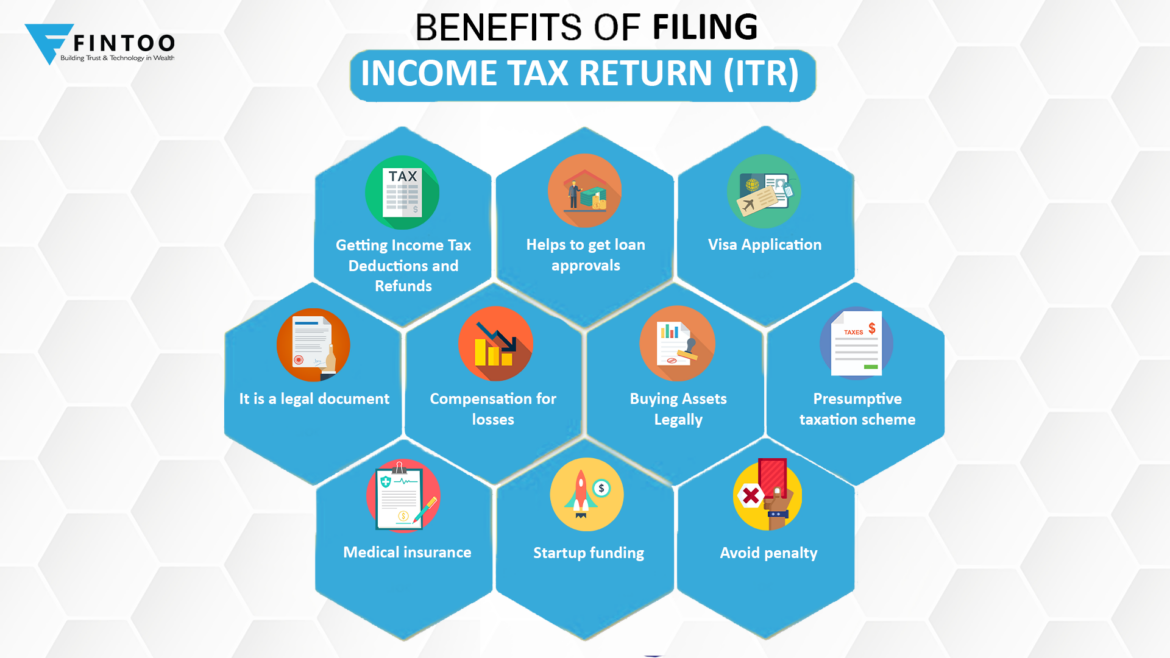

Filing Income Tax Returns before 31st July is an important responsibility of every taxpayer. However, many people view it as a burden and don’t file their returns or delay the process and rush to file their taxes at the last minute. This can cause unnecessary errors. And if you miss the due date, you will also be liable to pay a penalty for filing belated returns.
On the other hand, filing your ITR responsibly comes with a multitude of benefits.
In case you’re wondering how we have made a list of the top 10 benefits you can get by filing your ITR every year on time.
Getting Income Tax Deductions and Refunds:
You can claim certain deductions and refunds based on the nature of your investments, expenses, depreciation of assets, liabilities, etc.
Section 80C of the Income Tax Act provides a list of investment options that allow you to claim a deduction of up to Rs. 1.5 Lakhs.
Also Read: Know All About Deduction Under Section 80C
Helps to get loan approvals:
While applying for a loan, you will need to submit a few identity proofs such as an Aadhar card, PAN card, etc. But, in order to ascertain your eligibility, your bank will ask you to submit your ITR receipts for approximately the last 3 years as your income proof. This will help the bank to assess your financial situation and decide whether they should grant you a loan or not.
Hence, it is essential to file your ITR in order to secure a loan for your new home, car, child’s education, etc., Similarly, your ITR will also help you to apply for a credit card as credit card companies check your tax return statements before issuing a card to you.
Visa Application
Applying for a visa involves a couple of procedures. And if you haven’t filed your ITR, it can hamper your plans. The embassies and consulates of several countries approve your visa only after reviewing your ITR of the last couple of years, to ensure that you are financially capable of traveling abroad.
Therefore, filing your ITR will make your visa processing easier.
It is a legal document:
Your ITR can be used as proof of identity and proof of income. It can be used while applying for an Aadhar card, license, passport, etc. as the government allows you to use it as a proof of address.
Compensation for losses:
If you have incurred a loss in a particular year, you can carry it forward to the subsequent year. Section 70 and 71 of the Income Tax Act, permits you to set off your losses. However, you will need to file your ITR to benefit from this provision and claim the losses in the future.
Buying Assets Legally:
By filing your ITR, you gain the legal authorization to purchase various assets like a home, office, car, etc., and have them registered under your name without facing any legal problems.
Presumptive taxation scheme:
In the Union budget 2023, the government extended the limit for presumptive tax for small businesses from Rs. 2 crores to Rs. 3 crores and for individual professionals from Rs. 50 lakhs to Rs. 75 lakhs.
However, the increase in limits is subject to a condition that 95% of the receipts must be done online.
Under this scheme, self-employed people can pay their taxes based on their presumptive income. Meaning, you don’t need to maintain books of accounts.
Medical insurance:
If you are looking to purchase medical coverage of above Rs. 50 Lakhs, the insurance company will ask you to submit your Income Tax Returns as proof. So, to obtain a higher medical insurance plan, your ITR receipts will be required. Moreover, you can claim a maximum deduction of Rs. 50,000 on health insurance premiums paid in a fiscal year.
Startup funding:
Your ITR will come in handy to acquire adequate funds for your startup. This is because, investors often want to know the profitability, scalability, and other factors of your business before they decide whether to invest in your startup or not. So, you will need to have your ITR to provide information about the current financial standing of your company.
Avoid penalty:
If you file your ITR after the due date, you will be charged with a penalty of Rs. 1,000 if your total income is less than Rs. 5 lakhs. But if your income is above Rs. 5 lakhs, you will have to pay a late fee of Rs. 5,000. Plus, once you cross the tax payment deadline, you are required to pay interest at the rate of 1 percent per month on your tax amount.
Also Read: What Happens If You Forget To File Your ITR?
Conclusion
Apart from the benefits mentioned above, as a responsible citizen, it is your duty to file your returns on time as it contributes to the growth and development of the nation. Moreover, by being particular with your tax filing, you can take care of your financial well-being by avoiding any legal issues and penalties.
So, make sure you don’t delay your ITR filing process and get it done before the due date.
Disclaimer: The views expressed in the blog are purely based on our research and personal opinion. Although we do not condone misinformation, we do not intend to be regarded as a source of advice or guarantee. Kindly consult an expert before making any decision based on the insights we have provided.
Related Posts
Stay up-to-date with the latest information.


